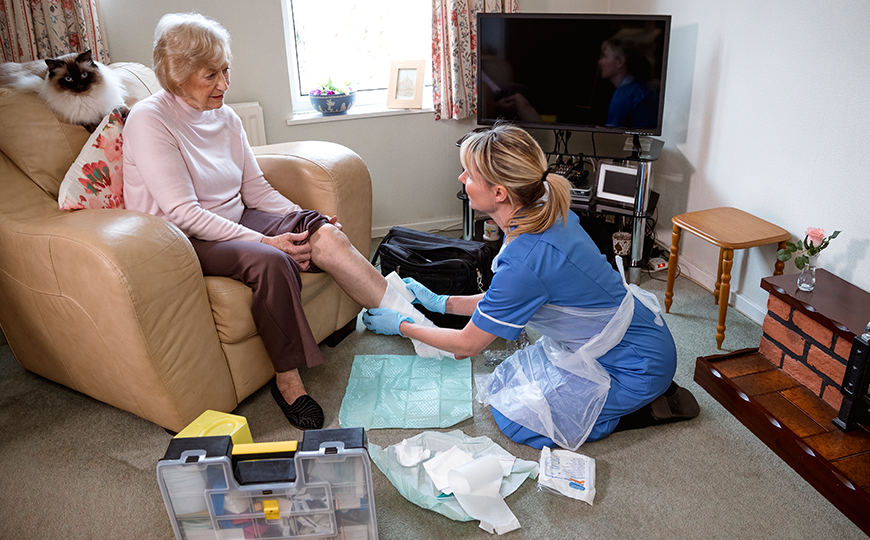https://www.infirmiere-canadienne.com/blogs/ic-contenu/2025/11/24/regard-coulisses-soins-infirmiers-a-domicile
Working where the individual lives helps nurses ‘deliver truly holistic care’
By Sandra Li-James
November 24, 2025
 istockphoto.com/SolStock
istockphoto.com/SolStock
Home care nurses need to contend with whatever they encounter in a home, whether that’s a crowded or messy space, distressed family members, or difficult pets. There’s no dedicated workspace. There are no colleagues down the hall and no emergency code cart.
Like every nurse who has spent decades working in a hospital, I’ve seen a lot. Through my experience in professional practice, I’ve had the opportunity to work with nurses caring for many diverse patient populations. So it was both wonderful and inspiring to discover, when I joined Ontario’s VHA Home HealthCare (VHA) three years ago as chief nursing executive, that the profession could still surprise me.
 VHA Home HealthCare
VHA Home HealthCare
“A good home care nurse is resourceful, compassionate, and able to adapt to each client’s environment, routine, and needs — and those of their families. They are resilient and creative problem-solvers,” Sandra Li-James says.
Over 25 years in hospitals, I had seen first-hand the importance of post-discharge care to a person’s recovery. Too many patients without proper supports or resources at home had to be readmitted to hospital or were visiting emergency departments when hospitals were already under strain. It became clear to me that providing enhanced care in people’s homes was a critical priority to support our aging population and address capacity challenges across the sector.
I knew I wanted to learn more, and I hoped my experience could help with the all-important collaboration between hospital teams and community organizations.
What I didn’t know was what home care nursing was actually like in real life. My hope is that more students and new nurses will have the chance to experience this type of nursing and understand the challenges and opportunities it offers.
Home care can be challenging, but is always meaningful
Early in my time at VHA, I had the honour of joining a nursing visit with an elderly client who was receiving palliative care to manage his symptoms as he drew nearer to end of life.
The client and his wife greeted the nurse warmly when we arrived. The familiarity between them was evident and touching. They chatted easily as the nurse asked them about a social engagement the couple had planned for the previous week. All the while, I could see that the nurse was assessing the client and determining what care he might need.
I watched as the nurse navigated the small space, creating a sterile field in the crowded living room, and stooped down to the low cot that had been set up to smoothly drain the fluid from around the client’s lungs. His wife stood nearby, observing everything, as the three continued to converse amicably. When the procedure was complete, the client’s wife reached over to accept the bag to dispose of it. She was clearly practised at assisting the nurse, and I was amazed at how efficiently the two worked as a team.
It was so different from seeing this task performed in a hospital. It was intimate, but also complex, a sort of intricate dance performed on the stage of the client’s home.
I was in awe of the nurse’s skill and the depth of the connection she had with the family. While providing care in the confined home environment, single-handedly adapting to whatever conditions she encountered, the nurse kept up a warm and friendly conversation. While she attended to the client, she was also looking after the whole family: answering questions, assessing the wellbeing of the caregiver and trying to uncover any needs they might have or issues in the environment that might need to be addressed.
This is the complex, challenging, and incredibly meaningful nature of home care nursing. Watch this video from VHA to learn more from the nurses about what inspires them to care for clients in their homes.
Home care nurses need to contend with whatever they encounter in a home, whether that’s a crowded or messy space, distressed family members, or difficult pets. There’s no dedicated workspace. There are no colleagues down the hall and no emergency code cart.
Working in someone’s home is incredibly intimate. Home care nurses are exposed to the inner details of their clients’ lives, including the nature of their relationships, vulnerabilities, and the way they live. This leads to a depth of connection that’s almost unimaginable in a hospital, and it allows home care workers to deliver truly holistic care. They perceive the challenges and opportunities in the environment, and they can get to the heart of what matters most to their clients and their caregivers.
In addition to providing clinical care, they advocate for their clients. This may include recommending additional services by other providers or sharing information about available resources in the community. They also manage and order supplies needed to provide client care.
And there’s the independence. For the most part, a home care nurse works autonomously — and this is one of the many things home care nurses enjoy about their work. They make decisions independently, on the spot, with the client’s needs firmly in mind.
Of course, there are robust supports in place, including a thorough orientation, ongoing education and best practice sharing, responsive supervisors, mobile devices for documentation and accessing resources and information on the go, and a network of experts and friendly colleagues who are always ready to help. But when it comes right down to it, home care nurses mostly work alone.
They schedule their own visits, providing a level of flexibility that appeals to many nurses. They travel through the community on a daily basis, which can be challenging at times, given unpredictable traffic and weather, and rising gas prices. Their car or bag functions as a nursing station and supply closet. They carry everything they need, from personal protective equipment to bandages, syringes, tubing, and bags, ready to adapt to whatever they encounter and whatever state the home is in.
The work is varied, with a new challenge in every home. Many clients have complex needs, and home care nurses work to their full scope of practice, often providing wound care, IV initiation, infusions, and managing gastrostomy tubes and medications. They are always assessing vital signs and symptoms, conducting head-to-toe assessments, and keeping their eyes open for anything their clients might need.
Like jazz musicians, they improvise beautifully in any setting. A home is an ever-changing environment, and no matter how well a nurse knows their clients, there are always surprises. The work is never routine, and every new day brings an opportunity for learning.
But what people enjoy most about home care nursing is providing genuinely person-centred and holistic care. Home care nurses — and everyone working in home care — help people stay in their homes and achieve their best possible health. Home care nurses don’t just provide care; they form bonds that matter, supporting and empowering their clients and caregivers and advocating for their needs.
Resilient and creative problem-solvers
A good home care nurse is resourceful, compassionate, and able to adapt to each client’s environment, routine, and needs — and those of their families. They are resilient and creative problem-solvers. They can quickly assess each situation and draw on their wealth of knowledge, skills, and resources to respond. They’re comfortable working alone and know when to ask for help.
Coming to home care from the hospital setting, I knew that the practice of nursing would be different. But I didn't realize how extensive the nurses’ scope of practice would be and how many opportunities there would be for nurses to learn and expand their skills with every visit.
As the population ages, the need for high-quality home care will continue to increase. Through preceptorships and collaborations with nursing schools, VHA hopes to introduce more nurses to the flexible and fulfilling field of home care nursing.
It’s not for the faint of heart, but neither is any nursing job. The work can be emotionally and physically exhausting. There are heartbreakingly difficult days — but they’re offset by the beautiful relationships, deep connections, and unexpected moments that develop when working in people’s homes. Home care nurses are priviledged to see clients when they are most vulnerable within their home environments and witness health recovery or, at times, health decline. It is comforting to know that home care nurses are able to support clients to be in their own settings that promote the best health outcomes.
Just as a jazz musician finds joy in the spontaneous creation of music, home care nurses find fulfillment in the unpredictable, dynamic, and deep nature of their work. Each day brings a new rhythm and a different melody.
I hope that more nurses will explore the potential of this rewarding career path.
Sandra Li-James, RN, is vice president, quality, best practice, education and chief nursing executive at VHA Home HealthCare.
#opinions
#career-stage
#community-health
#continuing-care
#home-care
#nurse-patient-relationship
#nursing-practice